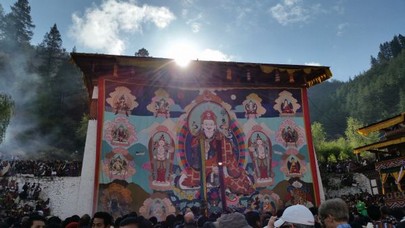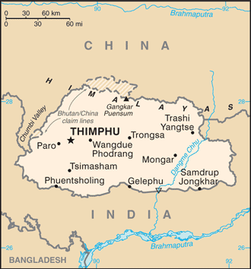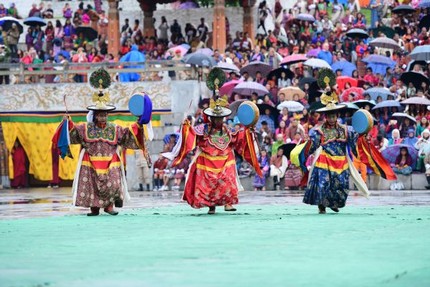Bhutan History and Geography
Bhutan History
 The documented history of the Kingdom begins in the 8th century with the legendary flight of Guru Padmasambhava from Tibet in 747 A.D, on the back of a tigress The Guru, also considered as second Buddha, alighted in Taktsang (Tiger's Nest ), in the valley of Paro and began the propagation of Tantric strain of Mahayana Buddhism.
The documented history of the Kingdom begins in the 8th century with the legendary flight of Guru Padmasambhava from Tibet in 747 A.D, on the back of a tigress The Guru, also considered as second Buddha, alighted in Taktsang (Tiger's Nest ), in the valley of Paro and began the propagation of Tantric strain of Mahayana Buddhism.In the ensuing centuries, many great masters preached the faith resulting in full bloom of Buddhism by the middle ages. Although sectarian at first, the country was eventually unified under Drukpa Kagyupa sect of Mahayana Buddhism by the saint /administrator, Shabdrung Ngawang Namgyal, in the early 17th century. The Shabdrung codified a comprehensive system of laws and built a chain Dzongs which guarded each valley during unsettled times and now servings the religious and administrative centre of the region.
In the next two centuries, the nation was once again caught up into regional fiefdoms with intermittent civil wars. Towards the end of the 19th century, the Trongsa Penlop, Ugyen Wangchuck, who then controlled the central and eastern region, overcame all his rivals and united the nation once again. He was unanimously crowned as the first King of Bhutan in 1907. The country now has the system of democratic monarchy. Bhutan is the last Mahayana Buddhist Kingdom, and the teachings of this school of Buddhism are living faith among its people.
The air of spirituality is pervasive even in urban centers where the spinning of prayer wheels, the murmur of mantras and glow of butter lamps are still important features of everyday life. Bhutan religious sites and institutions are not museums, but the daily home of its people.
Geography
 Bhutan is a tiny country situated in the Eastern Himalayas of southern Central Asia with the Tibet autonomous region of China in the north and the India in the south, east and west. A landlocked mountainous kingdom, Bhutan has a population of about a million. The country is 38,394 square kilometers in size.
Bhutan is a tiny country situated in the Eastern Himalayas of southern Central Asia with the Tibet autonomous region of China in the north and the India in the south, east and west. A landlocked mountainous kingdom, Bhutan has a population of about a million. The country is 38,394 square kilometers in size.Considered the last Shangri-La, Bhutan offers a land of spectacular contrasts and stunning beauty. Bhutan is a kingdom rich in the values of people, lifestyle, history, geographical location, tradition, culture, religion, arts, crafts and those ever-important festivals. All these are unique to the world and that is why visitors to this spectacular country leave with their wonderful experiences and ever-fresh memories they can never have from anywhere.
Falling in the Eastern Himalayas ranges Bhutan has extreme elevation ranging from 150 meters above sea level in the south to more than 7300 meters in the north.
ABOUT BHUTAN FESTIVAL
Bhutan is rich in cultural diversity and this richness is further enhanced by the wide variety of elaborate and colorful religious festivals that are celebrated
throughout the country.

Every village is known for their unique festival though the most widely known is the annual... Read more


